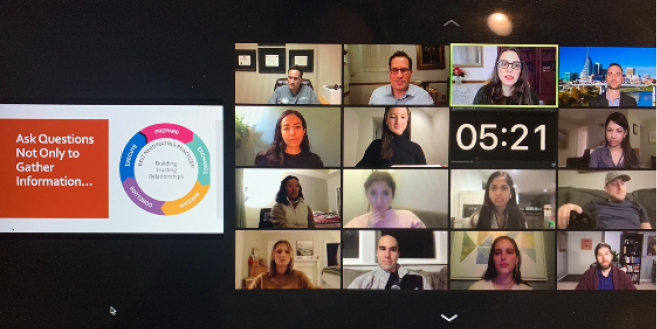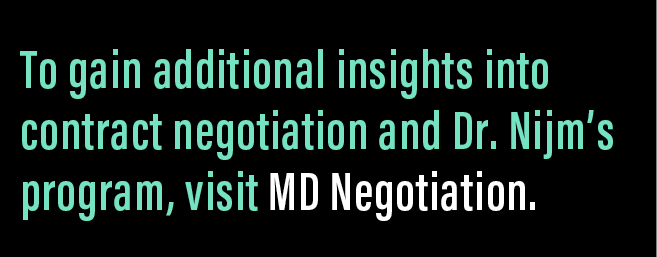After years of arduous training, young ophthalmologists are often thrilled about the prospect of becoming practicing physicians. Finally on the horizon are the much-anticipated opportunities to determine where one wants to live, to choose one’s preferred practice setting, and to be compensated for doing what one truly loves to do. However, as exciting as these next steps can be, they can also be stress-inducing, particularly when it comes to negotiating one’s first employment contract.
Physicians often receive little to no education regarding the business of medicine, putting them at a major disadvantage when it comes to high-stakes negotiations like employment contracts. Even established ophthalmologists may experience feelings of stress and uncertainty about which elements of a contract to negotiate and how. Although negotiation is not a skill that is taught to ophthalmologists in training, it is a skill that they should learn and practice before reaching a high-stakes scenario, not unlike the preparation for performing ocular surgery.
BEFORE THE CONTRACT
The process of negotiation actually begins well before a written contract comes into play. Prior to finding and applying for a job, ophthalmologists must think critically about their personal and professional goals. Taking time for self-reflection will help one to determine which type of job opportunity is right for oneself. Once that best-fit option has been identified and the application process begins, it is important to recognize the interview stage as an important initial step in contract negotiation.
During the interview process, ophthalmologists should explore the expectations of the hiring practice in relation to the following factors: work hours, location, call schedule, compensation structure, vacation, sick leave, exit strategies, and partnership opportunities. Discussing these key areas before receiving a written contract will help to establish both the ophthalmologist’s expectations and the practice’s expectations and will serve to shape the contract in advance. If the ophthalmologist does not properly express their expectations or ask the appropriate questions of the practice in the interview process, they may set themselves up for a more difficult negotiation when the time comes.
THE IMPORTANCE OF NEGOTIATION
Generally, when reviewing an employment contract, the ophthalmologist should identify around six or seven factors to negotiate. Only a handful of these items should be considered must-haves, as the goal of any negotiation is not to win but to reach an agreement.
A prospective employee has a much greater chance of reaching an agreement with the employer if both parties have a realistic understanding of one another’s expectations. If this communication does not take place, the employee risks signing a contract or entering a job with which they are ultimately unhappy. A survey by the AAO revealed that, although 91% of young ophthalmologists were satisfied with ophthalmology as their career choice, only 64% were happy with their practice setting.1 Ophthalmology is an incredible field, and the rewards of helping people to improve their vision are great. Unfortunately, unhappiness with a job situation likely comes down to not negotiating well and not having a clear understanding of how an employment contract will affect the employee on a daily basis.
MD NEGOTIATION
Given this knowledge and my training as a dual MD-JD, I have grown passionate about encouraging and helping my fellow physicians to take action and sharpen their negotiation skills. Over the last several years, I have lectured on negotiation for more than 40 residency programs across the country and conducted negotiation workshops at live meetings, such as the Women in Ophthalmology (WIO) annual meeting. In an effort to reach a wider audience and make a greater impact, I recently launched MD Negotiation, a resource designed to help physicians learn how to become better negotiators and access personalized coaching for developing their negotiation skills.
MD Negotiation is a case-based, practical skill building experience that enables participants to efficiently learn key concepts and hone critical skills needed for successful negotiation. Each workshop begins with an interactive information session that covers the fundamentals of negotiation as they relate to health care, ophthalmology, and the types of contracts that ophthalmologists typically encounter in their careers. From there, participants work in pairs to explore real-life case scenarios and role-play a negotiation process. They then discuss the results of the individual negotiations, highlighting strategies that can be utilized in the process of negotiating an employment contract.
My objective is for MD Negotiation to continue being utilized by residents and fellows, members of professional societies, and individual ophthalmologists as a tool to aid with negotiation training. I strive to customize each session with individualized feedback and insight into negotiation best practices for physicians from a legal perspective. In addition, I have designed specific workshops for mid-career physicians, women, minorities, and young ophthalmologists (Figure), as these individuals may face additional (and sometimes less-obvious) barriers to negotiation.

Figure | Dr. Nijm shares negotiation pearls from MD Negotiation with members of YoungMD Connect, a new membership-based platform for aspiring and young ophthalmologists, developed by Bryn Mawr Communications.
CONCLUSION
Not everyone is born a great negotiator, but you can learn how to become one. Many of the foundational elements of MD Negotiation are based on the Harvard School of Law Program on Negotiation and on my work with more than 70 expert negotiation instructors from around the country. Just as ophthalmologists study, practice, and enhance their surgical skills, the same due diligence should be applied to their negotiation skills. As a document with the power to dictate one’s day-to-day experience and overall quality of life, an employment contract is certainly worthy of such care and attention. Further, as a vital life skill, learning how to effectively negotiate will not only help you with your first job contract, but throughout your entire career.

1. Kent C. Ophthalmology: the next generation. December 7, 2011. Accessed January 1, 2021. https://www.reviewofophthalmology.com/article/ophthalmology-the-next-generation



